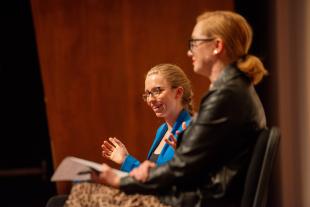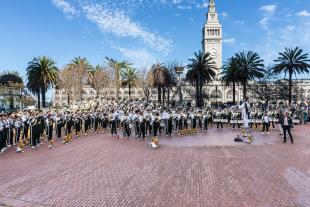‘You Have a Voice. Use it.’ Spike Lee Comes to Cal Poly
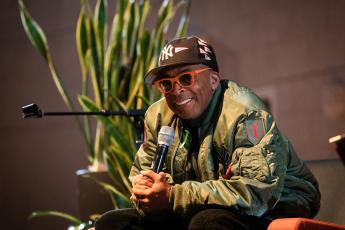
Oscar-winning filmmaker Spike Lee is going into his fourth decade telling stories, and he had a message for the crowd that gathered to watch him talk at Cal Poly: Young people, make some stories, please.
“There are so many new stories to tell,” Lee told hundreds of fans, including more than a few aspiring filmmakers, during a Feb. 10 conversation with Ethnic Studies Department Chair Denise Isom. “The truth is, as long as you keep paying money for the same old tired stories, they’ll keep making them.”
Lee came to San Luis Obispo to speak at two events: a fundraising dinner for Cal Poly’s Cross Cultural Centers, and a student-focused conversation in the Rec Center, hosted by ASI.
In addition to his acclaimed work as a director, writer, actor, producer and author, Lee is also a longtime faculty member at New York University’s Tisch School of the Arts in the Graduate Film Program.
“The first class of the semester, I stand before a class and tell them: ‘Filmmaking is a tough business.’ Everything, in my opinion, is repetition. To become good at something, you have to keep doing it.”
He urged the audience to use their talents, whatever they may be, to be heard.
“You have a voice. Put pen to paper, sing, dance. We have tools to voice our opinions, to express ourselves. We have a voice that has been heard and will continue to be heard.”
In the pair of talks, Lee discussed a few of his upcoming films, including “Da 5 Bloods” about the African American experience in Vietnam, and “Prince of Cats,” an ‘80s-set hip-hop take on Shakespeare’s “Romeo and Juliet.”
He also spoke of the impact his older works have today, like his third film, “Do the Right Thing.”
“It is still relevant today. We are talking about global warming, gentrification,” he said. “I’m honored that generations are still discovering it.”
But one of the criticisms of the film, Lee added, was that it did not provide an answer to racism.
“The artist’s job at times can be to hold up the mirror and let us see what no one else is talking about,” Lee said. “To let us see when people are turning away or putting their hands over their eyes. And then, by putting up the mirror and seeing the truth — yes, the ugly truth — and seeing that this problem exists, then together we can come up with a solution.”
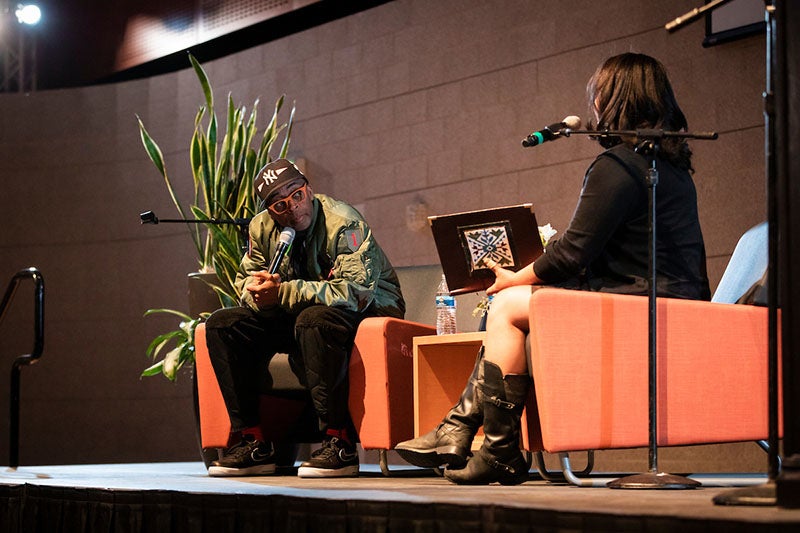
In response to a question about Black History Month, celebrated each year in February, Lee urged listeners to learn the truth about America’s founding: “This country was stolen from native people. My ancestors were stolen from mother Africa. We have to get to the truth, and the truth is ugly. We have to stop teaching our children boldfaced lies. It keeps perpetuating white supremacy at the expense of people who are human beings too.”
He suggested that members of the community dig deep and find the answers to systemic problems in themselves, in their families and their communities.
“L-O-V-E sounds trite, but you know, we’ve got to love each other,” Lee said. “That’s what it comes down to.”
Three campus community members — two students and a staff member — shared their stories at the Cross Cultural Centers’ inaugural dinner, a fundraising event to support the centers’ efforts to create a culturally rich environment at Cal Poly and within San Luis Obispo.
“As Spike Lee has said, ‘We don’t just dream, we plan,’ so it’s our plan to create a Cal Poly in which every student, staff member and faculty member feels empowered and loved,” Interim Director Beya Makekau said.
Ashley Calloway, a biochemistry major from Inglewood, California, who described herself as first-generation Afro-Latina, said she found the spaces, people and programs through the Cross Cultural Centers that keep her light shining. She participated in Poly Cultural Weekend as a prospective student and later, as a student, cultivated that experience for others. The event gives high school seniors and transfer students who have been conditionally accepted to Cal Poly a feel for campus life, the cultural community, and academic resources.
“What I love most about all of these experiences is I was never alone in any of my efforts,” Calloway said. “I was surrounded by other students determined to make Cal Poly a place where students feel safe, empowered and celebrated, and we won’t stop until we get there.”
Fifth-year civil engineering major Arelly Ocampo, the first in her family to attend college, found a safe and empowering space at the Cross Cultural Centers. She participated in the first ever production of “Original Womxn’s Narratives (OWN),” was a student lead on the on Día de los Muertos celebration on campus, and co-develop the Cross Cultural Experience, an alternative experience for WOW (Week of Welcome) participants that centers the voices of underrepresented students at Cal Poly.
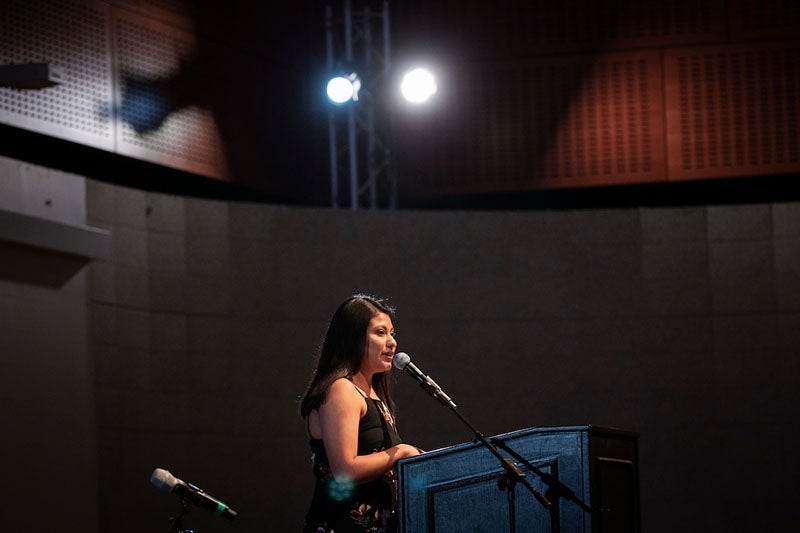
“Our existence, our resistance, and our success creates the ripples needed to ensure that Cal Poly becomes a place for everyone,” Ocampo said.
Lilianne Tang, coordinator at the Cross Cultural Centers and a first-generation, low-income Cambodian American woman, shared her experience finding community as an undergraduate at UC San Diego’s Cross-Cultural Center.
“Too often, students who come from similar backgrounds and experiences have been taught that our life circumstances are deficits,” she said. “We must have the commitment to support our students when they struggle.”
Referring to Cal Poly’s Cross Cultural Centers, Tang added: “Through our passion, leadership, advocacy, partnerships, programs and student-centered philosophy, the Cross Cultural Centers play an active role in addressing this issue by creating a safe, diverse, welcoming, inclusive, and equitable environment for students here on campus.”
Learn more and support Cal Poly’s Cross Cultural Centers at https://crowdfund.calpoly.edu/project/13938.



